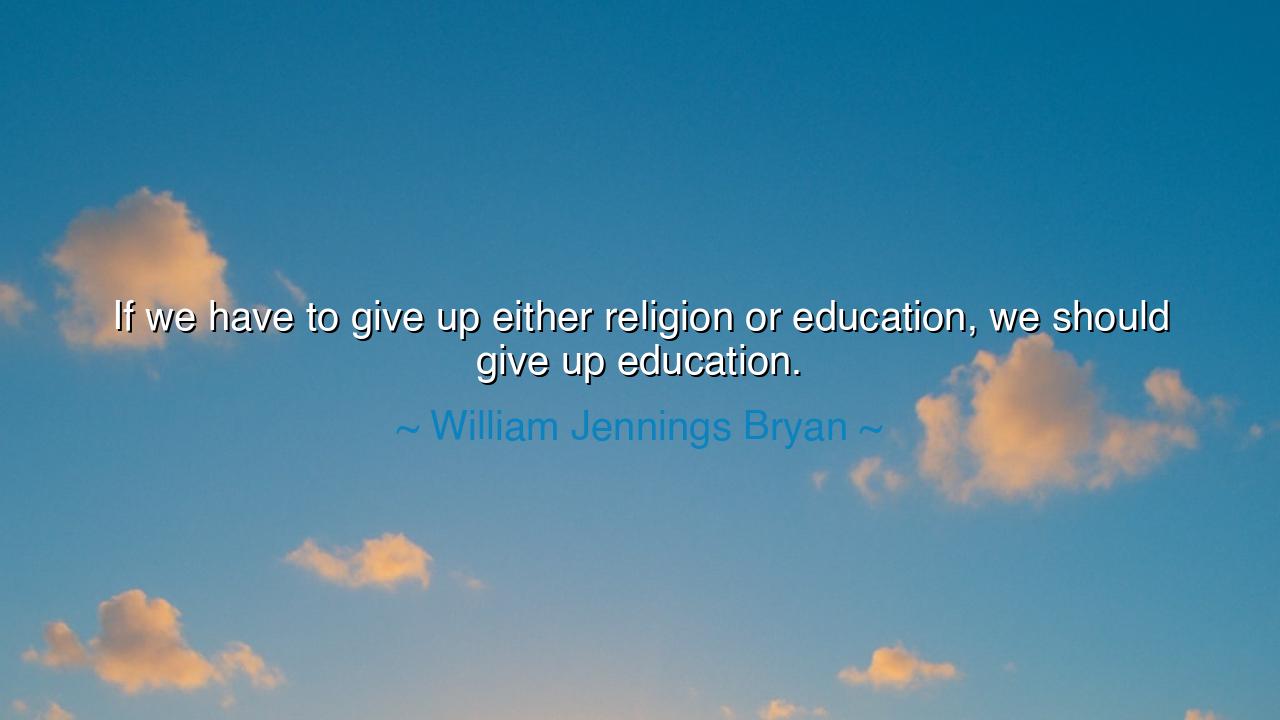
If we have to give up either religion or education, we should






"If we have to give up either religion or education, we should give up education." Thus declared William Jennings Bryan, the fiery orator of the late nineteenth and early twentieth century, a man whose voice rang with passion in the fields of politics, faith, and morality. He was a champion of the common man, a defender of traditional values, and an adversary in the famous Scopes Trial where the clash of science, education, and faith erupted in the public square. His words, though controversial, are steeped in a truth he held dear: that religion, to him, was the foundation of moral order, while education, without the guiding hand of faith, could become a tool of pride, error, and destruction.
The meaning of this quote lies not in a disdain for education, but in a conviction that religion provides the moral compass by which knowledge must be directed. To Bryan, education without a spiritual anchor risked becoming dangerous—an instrument of arrogance rather than wisdom, of cleverness without compassion, of intellect without soul. He believed that a society rich in knowledge but poor in morality would crumble, while a people with faith, even if simple in learning, could endure. His words remind us that wisdom is more than accumulation of facts; it is the union of knowledge with virtue.
History bears witness to his claim. The rise of Nazi Germany, in the most educated nation of Europe at the time, is a haunting example. Here was a people schooled in philosophy, science, and art, yet without a firm moral compass, that knowledge was twisted into tools of oppression and horror. Education without ethics gave birth to propaganda, brutality, and death camps. This is the nightmare Bryan warned against: knowledge unguided by faith or higher principles becomes not a blessing, but a curse.
Yet one must not mistake his words as hatred of learning. Bryan himself was highly educated and admired oratory, literature, and history. His warning was against placing education above the soul, against worshiping human intellect while discarding divine truth. For in his time, as in ours, there was a growing temptation to believe that the mind alone could solve all problems, that science could replace conscience, and that progress in knowledge would guarantee progress in morality. Bryan, like an ancient prophet, cried out that this was folly.
There are brighter stories too, where religion and education walked hand in hand. Consider the life of Florence Nightingale, whose profound religious faith led her to study medicine and nursing, and to apply her knowledge in the service of the sick and the poor. Her education gave her skill, but her faith gave her purpose, turning her learning into light for countless souls. Here we see what Bryan desired: not the abandonment of education, but its submission to a higher calling.
The lesson for us is clear: education must never be despised, but it must also never be idolized. Knowledge without conscience is like a ship without a rudder, swift but directionless. Religion, or the grounding principles of morality and higher truth, gives meaning and guidance to what we learn. It teaches us not only what we can do, but what we ought to do. Thus, Bryan’s words call us to balance: if forced to choose, let us keep our compass before our map, our soul before our science.
Practical action follows. Pursue education with vigor, but never sever it from principles of goodness, compassion, and humility. Study deeply, but measure what you learn against the higher law of justice and love. If you are a parent, teach your children not only to excel in knowledge, but to walk in virtue. If you are a student, do not let pride in your learning blind you to the wisdom of the spirit. And if you are a leader, remember that knowledge may build nations, but only faith and morality sustain them.
So I say to you, children of tomorrow: remember the cry of William Jennings Bryan. Knowledge alone cannot save a people; it must be joined with faith, with conscience, with moral vision. If ever the two are torn apart, choose first the soul—for with faith, knowledge may yet be rebuilt, but without faith, knowledge may destroy. Guard your spirit, and let your learning serve it, so that together they may form a foundation unshakable through the storms of time.






AAdministratorAdministrator
Welcome, honored guests. Please leave a comment, we will respond soon